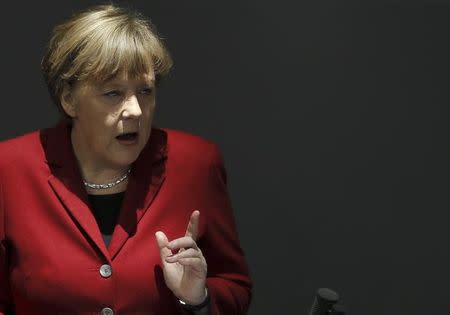Greek leader to face scepticism, criticism on first Berlin visit
By Stephen Brown BERLIN (Reuters) - Angela Merkel and Alexis Tsipras have sought to play down the drama of the Greek leader's first official visit to Berlin on Monday, but open scepticism among the Chancellor's allies has spawned media portrayals of a western-style showdown. Unsurprisingly perhaps, German media have cast Greece's leftist prime minister as the outlaw and the conservative German Chancellor as a sheriff fighting to keep the euro zone together. "When the Greek outlaw Alexis Tsipras meets Angela Merkel - seen as all-powerful in many countries - all of Europe will be watching spellbound," wrote Welt am Sonntag. The Frankfurter Allgemeine reminded Tsipras that the EU "is not the Wild West". Sticking to the Wild West imagery, a cartoon in Greece's To Vima newspaper depicted a sweating Tsipras in dungarees pumping an old-fashioned railway handcar uphill while Merkel timed him. Both leaders would be aghast at this confrontation scenario. Although Merkel acknowledged last week that she and Tsipras would talk "and perhaps also argue", she said it would not be a defining moment in the standoff between Athens and its euro zone creditors over the terms of its 240 billion euro bailout deals. Tsipras told Greek newspaper Kathimerini that he saw their talks, which will include a joint news conference at 6.15 p.m. (1.15 p.m. EDT) on Monday, as "a meeting that will not be 'under pressure' from negotiations".Some hope. At last week's EU summit, Greece promised to meet creditors' demands to present an economic reform package within days to unlock the cash it needs to avoid crashing out of the euro - a dire prospect for Germany, the currency zone's largest economy. Despite Merkel's assurances that she did not expect Tsipras to bring these commitments in his briefcase to Berlin, her own coalition upped the ante by demanding precisely that. German politicians are openly skeptical about Greece's new leaders, none more so than 72-year-old Finance Minister Wolfgang Schaeuble who has clashed repeatedly with his unruly 53-year-old Greek peer Yanis Varoufakis. Schaeuble says Athens has "totally destroyed the trust of its European partners". "It would be good if Tsipras can convince the Chancellor on Monday that he grasps the seriousness of the situation," said Markus Soeder, Bavaria's conservative state finance minister. "So far, Greece has promised but not delivered." BRING THE LIST "I expect (Tsipras) to present this list in his talks with the Chancellor on Monday," said Thomas Oppermann, parliamentary leader of Merkel's Social Democrat coalition partners. "I want to know once and for all if Greece is ready to reform or not." But Economy Minister Sigmar Gabriel, who leads the SPD, was not sure Tsipras could meet that deadline: "He must do it but I don't know if he will able to tomorrow already." He told German TV he hoped the visit would "relaunch" bilateral relations. With Berlin braced for Greece coming back for yet more aid in a matter of months, Merkel's supporters look unlikely to okay a third bailout without real evidence of progress on reforms. "Nothing will happen if the Greek government is not crystal-clear in its willingness to reform," said Oppermann. The Greek government's revival of reparation claims from the Nazi occupation in World War Two has added to the Greco-German tensions. Germany is conscious of its historical responsibility but reluctant to link this to euro zone policy. "The two things are unrelated," said Gabriel. "The Fourth Reich" was the title of Der Spiegel magazine's main story this weekend, with a photo montage on its cover of Merkel on the Acropolis in Athens accompanied by Nazi officers. Bild am Sonntag had moving interviews of survivors of the 1944 Nazi massacre of more than 200 people in the Greek village of Distomo - as well as a poll saying 71 percent of Germans were opposed to paying further World War Two reparations to Greece. But Greek Foreign Minister Nikos Kotzias, who met Germany's Frank-Walter Steinmeier on Sunday, looked likely to insist on reparations and repeated a warning - seen as a threat when he first made it earlier this month - that western Europe could be flooded with immigrants if Greece's situation decays further. "What I say is, if you break us, what will happen?" he told Sueddeutsche Zeitung in an interview to be published on Monday. "If millions of people move, nobody knows what will happen." (Additional reporting by Karolina Tagaris in Athens; Writing by Stephen Brown; Editing by Ralph Boulton and Stephen Powell)



